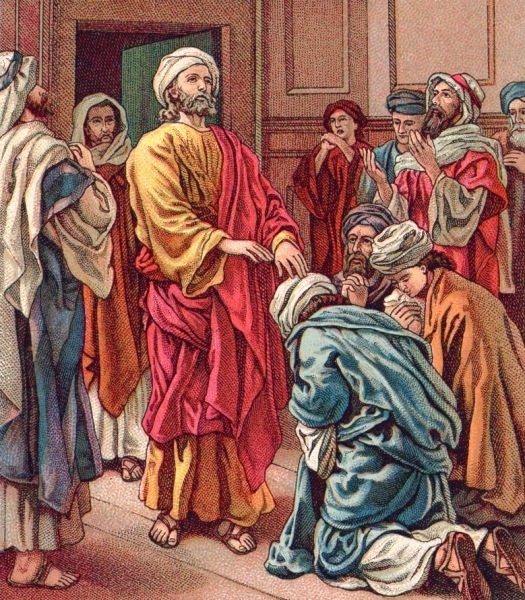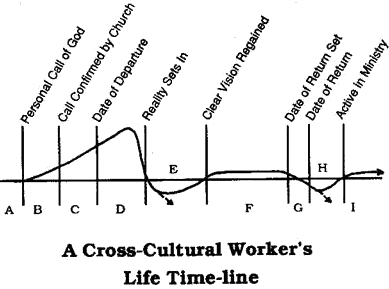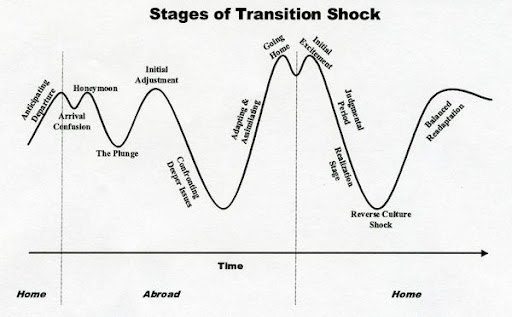The Necessity of a Home Church Support Group- by Kevin E. Jesmer 5-10-15
The Necessity of a Home Church Support Group
Acts 12:25-13:5 By Kevin E. Jesmer 5-10-15
Key verse 13:2-3,
“While they were worshiping the Lord and fasting, the Holy Spirit said, “Set apart for me Barnabas and Saul for the work to which I have called them.” 3 Then after fasting and praying they laid their hands on them and sent them off.” (ESV)

I have been around mission minded Christians for the past 29 years. I have always prayed for missionaries to be raised up and for missionaries to be sent to this place and to that place. “Lord, send out workers into the harvest field.” (Matt 9:38) But I never once prayed for a sending church support team to be raised up to support the missionaries that will be sent. We pray, “Send missionaries”, when we should be praying, “Send missionaries and raise up a support team at their home church.” This paper explores the need for a support teams in churches who send missionaries. It will highlight how God is establishing a support team for the First Nations Canada Mission at KBC. It will look at some ways that a support group may function and also present some thoughts for the future.
Part 1: Missionary Support Teams Were In The Early Church
Let’s refresh our minds concerning the first sending off of missionaries in regards to the Antioch church. Look at chapter 12:25-13:4…
“25 And Barnabas and Saul returned from Jerusalem when they had completed their service, bringing with them John, whose other name was Mark. 13 Now there were in the church at Antioch prophets and teachers, Barnabas, Simeon who was called Niger, Lucius of Cyrene, Manaen a lifelong friend of Herod the tetrarch, and Saul. 2 While they were worshiping the Lord and fasting, the Holy Spirit said, “Set apart for me Barnabas and Saul for the work to which I have called them.” 3 Then after fasting and praying they laid their hands on them and sent them off. 4 So, being sent out by the Holy Spirit, they went down to Seleucia, and from there they sailed to Cyprus. 5 When they arrived at Salamis, they proclaimed the word of God in the synagogues of the Jews. And they had John to assist them.” (ESV)
This church was very cosmopolitan, made up of people from different countries and backgrounds. Barnabas was a Levite from Cyprus who had been a pillar of the Jerusalem church. He knew how to see the work of God in others and embrace them. Simeon was called “Niger”. Niger is a country and a river in Africa. Perhaps he was from Africa. Lucius of Cyrene may have been Greek. His Latin name indicates Roman influence. Manaen had been brought up with Herod the tetrarch. He must have been a privileged person living in the royal court. Saul had been a Pharisee in Tarsus. This diverse group worked in one spirit to build up the local church. Indeed, Antioch, was a Gentile and cosmopolitan city, a city where idol worship prevailed. But within its boundaries an equally cosmopolitan, international church was born and established…a church that had matured in faith to the point where they were sending out missionaries.
The Antioch Christians sought the will of God for their personal lives and for their growing church. Look at verse 2, “While they were worshiping the Lord and fasting, the Holy Spirit said, “Set apart for me Barnabas and Saul for the work to which I have called them.” One day, as they were fasting and praying, God revealed his will for world mission by setting apart for himself Barnabas and Saul to be the first missionaries to the Gentiles. It wasn’t easy to obey the will of God, for these two leaders were indispensable to the life of the young church. But they trusted and obeyed God and they sent out the first missionaries. I would like to say, Jesus “unleashed” these first missionaries to the Gentile world, through the sending church.
At this meeting in Antioch, there were representatives of the church sending out the missionaries. Verse 1 reads, “Now there were in the church at Antioch prophets and teachers, Barnabas, Simeon who was called Niger, Lucius of Cyrene, Manaen a lifelong friend of Herod the tetrarch, and Saul.” There were people from varied backgrounds standing in places of leadership in this sending church. They offered different gifts and talents to the group. What they had in common was personal relationship with the missionaries, their love for God and their desire to see the name of Jesus proclaimed to the ends of the earth.
After much fasting and prayer, the representatives sent them off. Verse 3 reads, “Then after fasting and praying they laid their hands on them and sent them off.” They did not send out missionaries carelessly or haphazardly. They were so sincere to seeking and finding the will of God in the matter of sending out Saul and Barnabas that they fasted and prayed. This would affect the whole church. They knew they were on the cusp of a world wide movement, where God was going to fling the Gospel to the ends of the earth through the church and missionaries. The church never took this lightly. They fasted and prayed. And at the laying on of hands, Barnabas and Saul were “Ekballo’d”, that is, flung out, into the Roman world. The missionaries were unleashed to follow the leading of the Holy Spirit. (13:4)
We focus on the wondrous exploits God brought about through Saul and Barnabas. God did a lot of work through their surrendered lives. But we must also acknowledge the lives of faith of the prophets and teachers, leaders like Simeon who was called Niger, Lucius of Cyrene, Manaen a lifelong friend of Herod the tetrarch and the rest of the support group that was in Antioch. They too were an integral part of the sending out of the missionaries.
Part 2: The Need Explained For A Missionary Support Group
At a recent meeting, a missionary couple, talked about the importance of the having a support team back at home, when they move to the mission field. They showed a graph of a cross cultural worker’s timeline. The graph was basically a graph of emotional strength vs. time. In the graph, the initial, emotional “high” of missionary life quickly plummets after the missionaries move to a mission field and face the realities of serving in an isolated, cross cultural setting. The missionaries are entering into the departure phase of the mission with their “eyes wide open.” They know what they are going to face and they humbly implored the support team to make a great effort to support them.

From a search on Yahoo images, “serving as senders, graph, cross cultural”

There is a great need for support team members back home. I have read in the book, Serving As Senders, that there should be eight support team members for every missionary family sent out. They also provided a suggested structure of a support team. It is as follows;
There are six areas of support for missionaries.
- Moral Support – giving an encouraging word
- Logistics support – all the bits and pieces
- Financial support – money, money, money
- Prayer support – Spiritual warfare at its best
- Communication support – letters, MP3’s, and more.
- Re-entry support – More than applauding the safe travels
In the back of the latest Ekballo Magazine (p. 19), March 2015 edition, (The mission magazine for “To Every Tribe”, missions agency), is a short article on how the home church can support the missionary team. It is written by Justin Vander Ark, the director of communications and development for “To Every Tribe”. The following is a summary of the points he has made in the article. Some paragraphs are quotes and some sentences are summaries of what he has written. I did this for the sake of brevity for this report. To view the original article, go to the “To Every Tribe” web site.
http://www.toeverytribe.org/resources/ekballo-magazine/
The link to the March 2015 edition, page 19.
https://docs.google.com/file/d/0B-Y6w7CD4l6yZjNNZ185ZktGd1E/edit?pli=1
The topics Justin introduces are:
- Pray 2. Give 3. Send 4. Email 5. Email updates 6. Gifts 7. Visits 8. Care teams 9. The Loop 10. Ask
Justin fleshes out each category.
- Pray. Prayer is a weapon of warfare that God has given to his saints. Ask the missionaries how you can specifically pray for them.
- Give. Most missionaries are below their monthly support goal and have to spend precious time and resources on fund raising. Giving money is a direct way to bless the missionary.
- Send. More missionaries are needed. With thousands of unreached people groups remaining in the world, the need is great. Join with your local church in sending more missionaries to get trained and sent out into the world.
- Email . Missionaries love getting email. Send spontaneous words of encouragement and let them know you are praying for them. Think of the special days in their lives. Send some care packages.
- Email updates. Subscribe to missionary updates. Respond to the updates to let them know you are reading and praying for them. Relay what you have been moved to pray. Send church updates.
- Gifts. Missionaries are very frugal. They don’t spend on themselves often. People can send them gifts. What about favorite foods from the hometown, kindle books, digital music, gift cards, Christmas stockings? And don’t forget about the kids!
- Visits. Missionaries often feel isolated and all alone. Visit them while they are in missionary training. Invite them over to your home when they are on furlough. Visit them on the field or support someone who can. Visit them via social networks. Offer to pick up the tab for internet use.
- Care teams. Put together care teams from the church to head up efforts to care for and bless the missionaries. Prayer, care packages, notes of encouragement, offers of help while on furlough, are all essential.
- The Loop. Keep your missionaries up to date on what’s going on in your church so that they can pray for you. Let them know about answered prayers. Give them opportunities to bless you and your church.
- Ask. Ask your missionaries how you can bless them. Just this simple act of asking let’s them know you are thinking of them and want to be part of their mission.
From this point on, I will not only pray for workers to be sent out into the harvest field, but I will also pray for the raising up of a strong support network to be established from among the ranks of the sending church.
Acts 13:2-3,
“While they were worshiping the Lord and fasting, the Holy Spirit said, “Set apart for me Barnabas and Saul for the work to which I have called them.” 3 Then after fasting and praying they laid their hands on them and sent them off.” (ESV)






Interact with us using Facebook